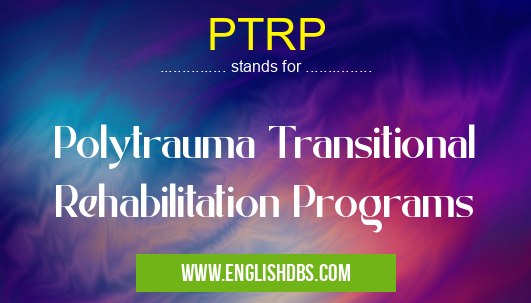What does PTRP mean in REHABILITATION
PTRP stands for Polytrauma Transitional Rehabilitation Programs. These programs are designed to provide comprehensive rehabilitation services to individuals who have sustained multiple severe injuries, often referred to as polytrauma.

PTRP meaning in Rehabilitation in Medical
PTRP mostly used in an acronym Rehabilitation in Category Medical that means Polytrauma Transitional Rehabilitation Programs
Shorthand: PTRP,
Full Form: Polytrauma Transitional Rehabilitation Programs
For more information of "Polytrauma Transitional Rehabilitation Programs", see the section below.
What is Polytrauma?
Polytrauma refers to a combination of two or more serious injuries that typically involve multiple body systems, such as head injury, spinal cord injury, and limb fractures. These injuries can significantly impact an individual's physical, cognitive, and emotional well-being.
Purpose of PTRP
PTRP aims to provide a seamless transition from acute care to long-term rehabilitation services for individuals with polytrauma. The goal is to optimize recovery outcomes, enhance functional abilities, and facilitate reintegration into the community.
Services Offered by PTRP
PTRP typically offers a wide range of services, including:
- Medical management: Stabilization of medical conditions, pain management, and wound care.
- Physical therapy: Restoring mobility, strength, and balance.
- Occupational therapy: Improving daily living skills, such as dressing, eating, and hygiene.
- Cognitive rehabilitation: Memory, attention, and problem-solving enhancement.
- Speech therapy: Addressing communication and swallowing difficulties.
- Psychological support: Counseling and therapy to address emotional and psychosocial challenges.
- Vocational rehabilitation: Assistance with job training, career counseling, and work placement.
Benefits of PTRP
PTRP can have numerous benefits for individuals with polytrauma, such as:
- Improved functional outcomes: Enhancing mobility, independence, and self-care abilities.
- Reduced risk of complications: Early intervention can prevent or mitigate long-term health issues.
- Enhanced quality of life: Improving physical, cognitive, and emotional well-being.
- Increased community reintegration: Supporting individuals in returning to their homes, workplace, and social activities.
Essential Questions and Answers on Polytrauma Transitional Rehabilitation Programs in "MEDICAL»REHABILITATION"
What are Polytrauma Transitional Rehabilitation Programs (PTRPs)?
PTRPs are specialized rehabilitation programs designed to provide comprehensive care to individuals who have sustained multiple traumatic injuries, known as polytrauma. These programs focus on facilitating recovery and transition from acute care to rehabilitation and ultimately back to the community.
Who benefits from PTRPs?
PTRPs are primarily designed for individuals who have sustained severe polytrauma involving injuries to multiple body systems or regions, such as the head, spine, extremities, and internal organs. These individuals typically require intensive rehabilitation to address their complex physical and cognitive impairments.
What services do PTRPs offer?
PTRPs provide a wide range of services, including:
- Physical and occupational therapy
- Cognitive and speech therapy
- Pain management
- Vocational rehabilitation
- Psychological counseling
- Social support services
- Discharge planning
What is the duration of PTRPs?
The duration of PTRPs varies depending on the individual's needs and progress. However, these programs typically last for several months to a year or more.
Where can I find a PTRP?
PTRPs are typically located in specialized rehabilitation hospitals or centers. To find a PTRP near you, consult with your healthcare provider or search for certified programs in your area.
Are PTRPs covered by insurance?
Coverage for PTRPs varies depending on the type of insurance and individual policies. It is recommended to contact your insurance provider to determine your coverage options.
Final Words: PTRP plays a crucial role in the rehabilitation journey of individuals with polytrauma. By providing comprehensive and coordinated services, these programs facilitate recovery, maximize functional abilities, and empower individuals to lead fulfilling and meaningful lives.
